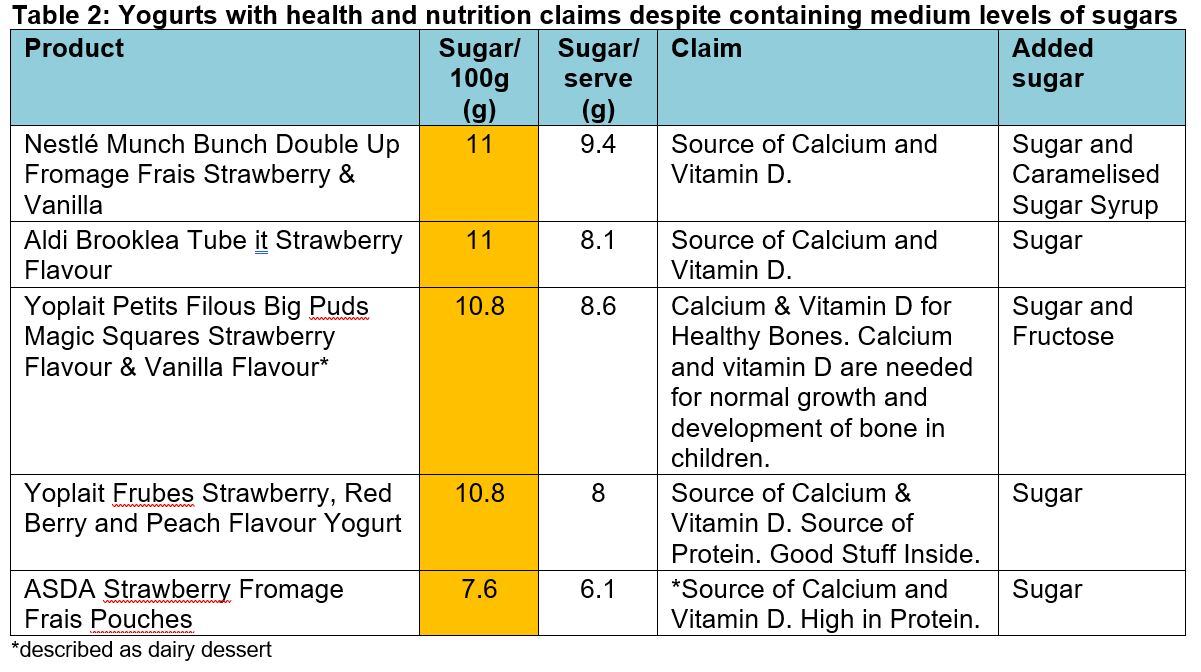Only 1 in 20 (5%) of yogurts with child-friendly packaging contain low levels of sugar, according to the UK health campaigner. Progress to reformulate and reduce added sugar in yogurts with child friendly packaging is ‘disappointingly sluggish’, it said.
The group surveyed 100 yogurts which it claimed featured cartoon animations, characters and designs that deliberately target children, and which were rated low (green) in sugar, as per government guidelines.
Over half (63%) of all the yogurts provide a third or more of a 4-6-year old’s maximum daily intake for added sugars (19g) per serving, the group claimed.
The worst offender, according to the analysis, was Nestlé Rolo Mix-in Toffee yogurt with 5 ½ teaspoons of sugar per serve (22g), followed by Nestlé Smarties Vanilla Flavour yogurt, with 4 teaspoons of sugar per serve (16.5g).

The group of experts is now calling for government restrictions on using child friendly packaging, and nutrition and health claims on yogurts (high or medium in sugar) to stop misleading parents.
‘Distorted’ health halos
The report also took aim at the Nestlé Munch Bunch Double Up Fromage Frais Strawberry & Vanilla product for championing claims about calcium and vitamin D, whilst containing added sugar, syrups and fruit concentrates (all of which are ‘free sugars’ known to be harmful to children’s health and their teeth). This creates a distorted ‘health halo’, the campaigner said, suggesting the products are completely healthy with only sugars from natural sources such as lactose from milk, which distracts parents from scrutinising the nutrition labels more carefully.

The group claimed that with ten children out of every class of thirty leaving primary school either overweight or obese, it was “imperative that food companies act more responsibly and commit to reformulate sugar, salt and calorie reduction instead of foisting unhealthy products on us that contain child friendly packaging with misleading nutrition and health claims”.
Dr Kawther Hashem, Campaign Lead at Action on Sugar said: “Parents can easily be misled when walking through the yogurt aisle in the supermarket. Often companies try to avert our eyes from seeing the significant amount of sugar listed in the ingredients and nutrition tables, by using healthy sounding claims and cartoony images on the front of pack.
“Given only 5% of yogurts with child friendly packaging would have a green coloured label as being ‘healthy’ for sugar, food companies must make every effort to reduce the sugar in these products, particularly the ones targeted so explicitly towards children.”
Katharine Jenner, Campaign Director at Action on Sugar, added: “Clever marketing techniques such as advertising, promotions and packaging are powerful tools to get children hooked on the sweet stuff from a young age and for life. Whilst the Government’s Obesity Strategy is taking bold steps to tackle unhealthy advertising and promotions, they now need to ensure food companies only use cartoons and health halo statements on their healthier products, allowing parents to see more of what is good for their children.”
Responding to the claims, a Nestlé spokesperson told FoodNavigator the company is committed to the UK’s government’s voluntary reduction programme calling on manufacturers to cut sugar 20% across nine categories.
“Lactalis Nestlé Chilled Dairy UK is fully committed to the PHE sugar reduction programme and have an ongoing programme of innovation, reformulation and size reduction to remove calories and reduce sugar in our products. Indeed we have reduced sugar by more than 20% in our yogurt products since the baseline start of this programme in 2015 which is the equivalent of 4.8 tonnes of sugar removed,” the spokesperson said.
“We have had a programme of reformulation in our children’s dairy products for many years. We have made changes to the products which are inherently challenging to reformulate to a sufficient degree without impacting taste and quality. In addition, any new products we develop will contain lower than average or no added sugar.”


